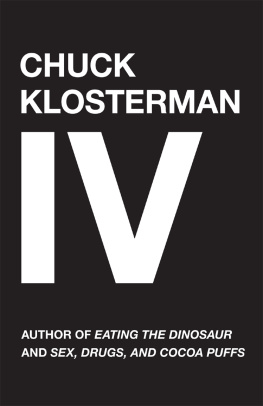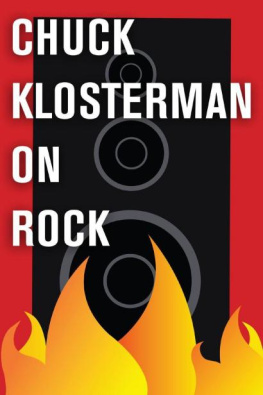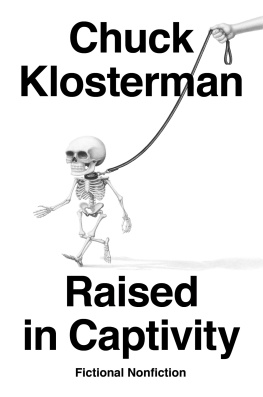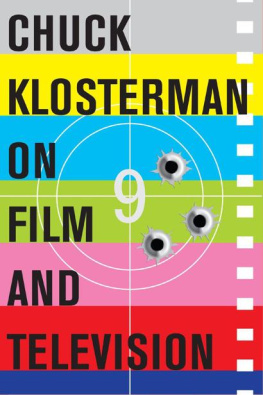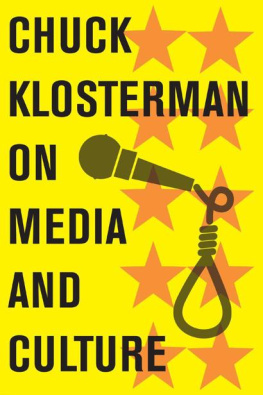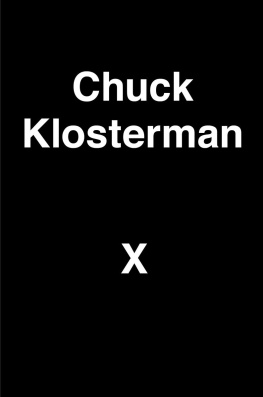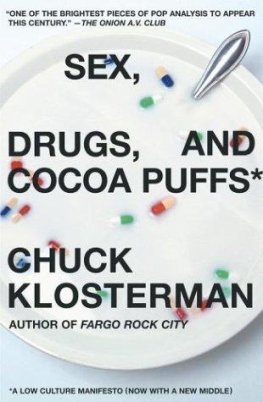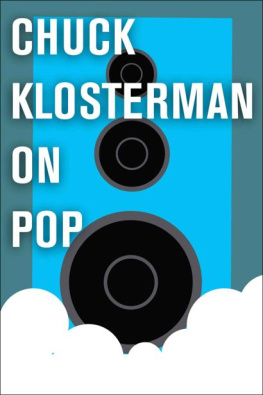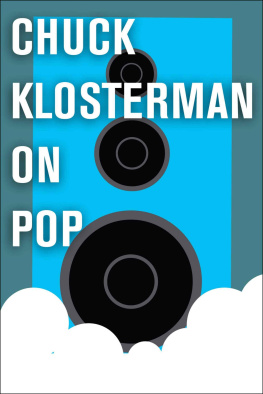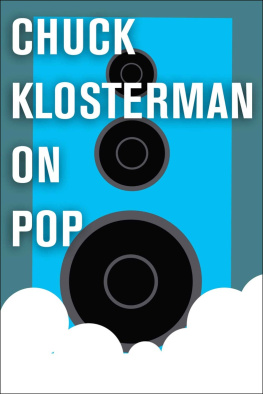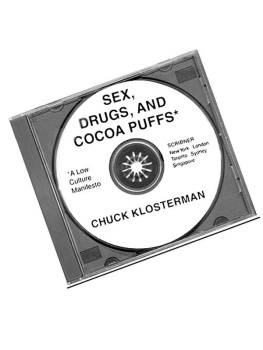
ALSO BY CHUCK KLOSTERMAN
Fargo Rock City:
A Heavy Metal Odyssey in Rural Nrth Dakta
Sex, Drugs, and Cocoa Puffs:
A Low Culture Manifesto
Killing Yourself to Live:
85% of a True Story
Chuck Klosterman IV:
A Decade of Curious People and Dangerous Ideas
Downtown Owl:
A Novel
EATING THE DINOSAUR
CHUCK KLOSTERMAN
SCRIBNER
New York London Toronto Sydney

SCRIBNER
A Division of Simon & Schuster, Inc.
1230 Avenue of the Americas
New York, NY 10020
www.SimonandSchuster.com
Copyright 2009 by Chuck Klosterman
All rights reserved, including the right to reproduce this book or portions thereof in any form whatsoever. For information address Scribner Subsidiary Rights Department, 1230 Avenue of the Americas, New York, NY 10020.
First Scribner hardcover edition October 2009
SCRIBNER and design are registered trademarks of The Gale Group, Inc., used under license by Simon & Schuster, Inc., the publisher of this work.
For information about special discounts for bulk purchases, please contact Simon & Schuster Special Sales at 1-866-506-1949 or business@simonandschuster.com.
The Simon & Schuster Speakers Bureau can bring authors to your live event. For more information or to book an event contact the Simon & Schuster Speakers Bureau at 1-866-248-3049 or visit our website at www.simonspeakers.com.
DESIGNED BY THE DESIGNOSAUR
Manufactured in the United States of America
1 3 5 7 9 10 8 6 4 2
Library of Congress Cataloging-in-Publication Data
Klosterman, Chuck, 1972
Eating the dinosaur / by Chuck Klosterman.1st Scribner hardcover ed.
p. cm.
1. Popular cultureUnited States. 2. Consumption (Economics)Social aspectsUnited States. 3. SportsSocial aspectsUnited States. 4. United StatesCivilization1970 I. Title.
E169.12.K555 2009
973.92dc22
2009018719
ISBN 978-1-4165-4420-3
ISBN 978-1-4391-6848-6 (ebook)
There is something insane and self-contradictory
in supposing that things that have never yet been done
can be done except by means never tried.
Francis Bacon, The New Organon
Thats not the way the world really works anymore.
Were an empire now, and when we act, we create our own reality.
And while youre studying that realityjudiciously, as you will
well act again, creating other new realities, which you can
study too, and thats how things will sort out.
unnamed George W. bush senior adviser,
speaking to New York Times reporter Ron suskind in 2002
Dont Believe the TruthI dont know what the title means.
Its a pothead thing, innit?
Liam Gallagher of Oasis, discussing his own album
EATING THE DINOSAUR
Something Instead
of Nothing
For the first twelve years of my adult life, I sustained a professional existence by asking questions to strangers and writing about what they said.
Why did you do it? I would ask these strangers. It did not matter what it was. What were you thinking while you did that? Did it satisfy you? What does it mean to be satisfied? Do you consider yourself to be famous? How does it feel to be famous? How did this experience change you? What elements didnt change? What will never change? What drives you? Are you lying to me right now? Why should I care about what you are saying? Is this all a construction? Are you constructed? Who constructed you? What was their purpose? Does God exist? Why or why not? Thank you very much. It was great meeting you in the lobby of this unnecessarily expensive hotel.
This has been a tremendous way to earn a living. Who wouldnt enjoy getting paid for being curious? Journalism allows almost anyone to direct questions they would never ask of their own friends at random people; since the ensuing dialogue exists for commercial purposes, both parties accept an acceleration of intimacy. People give emotional responses, but those emotions are projections. The result (when things go well) is a dynamic, adversarial, semi-real conversation. I am at ease with this. If given a choice between interviewing someone or talking to them for real, I prefer the former; I dont like having the social limitations of tact imposed upon my day-to-day interactions and I dont enjoy talking to most people more than once or twice in my lifetime.
For the past five years, Ive spent more time being interviewed than conducting interviews with other people. I am not complaining about this, nor am I proud of it its just the way things worked out, mostly by chance. But the experience has been confusing. Though I always understand why people ask me the same collection of questions, I never know why I answer them. Frankly, I dont know why anyone answers anything. The obvious explanation is that the interviewee is hoping to promote a product or a concept (or the concept of themselves, which is its own kind of product), but thats reductive and often untrue; once a media entity makes the decision to conduct and produce an interview with a particular somebody, the piece is going to exist regardless of how the subject responds to the queries. The interviewee can say anything, even if those sentiments contradict reality. They can deliver nothing but clichs, but the story will still run. On three occasions Ive consciously (and blatantly) attempted to say boring things during an interview in the hope of killing the eventual article. It only worked once. But this type of behavior is rare. Most of the time, I pretend to be interesting. I try to frame my response in the context in which the question was asked, and I try to say things I havent said before. But I have no clue as to why I do this (or why anyone else does, either).
During the summer of 2008, I was interviewed by a Norwegian magazine writer named Erik Moller Solheim. He was good at his job. He knew a lot of trivia about Finlands military history. We ate fried pork knees and drank Ur-Krostitzer beer. But in the middle of our playful conversation, I was suddenly paralyzed by an unspoken riddle I could not answer: Why was I responding to this mans questions? My books are not translated into Norwegian. If the journalist sent me a copy of his finished article, I could not read a word of it. I dont even know what the publications name (Dagens Naeringsliv) is supposed to mean. I will likely never go to Norway, and even if I did, the fact that I was interviewed for this publication would have no impact on my time there. No one would care. The fjords would be underwhelmed.
As such, I considered the possible motives for my actions:
1. I felt I had something important to say. Except I did not. No element of our interaction felt important to me. If anything, I felt unqualified to talk about the things the reporter was asking me. I dont have that much of an opinion about why certain Black Metal bands burn down churches.
2. Its my job. Except that it wasnt. I wasnt promoting anything. In fact, the interaction could have been detrimental to my career, were I to have inadvertently said something insulting about the king of Norway. Technically, there was more downside than upside.
3. I have an unconscious, unresolved craving for attention. Except that this feels inaccurate. It was probably true twenty years ago, but those desires have waned. Besides, who gives a fuck about being famous in a country Ill never visit? Why would that feel good to anyone? How would I even know it was happening?
4. I had nothing better to do. This is accurate, but not satisfactory.
Next page

